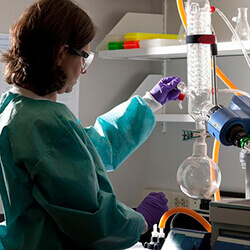Transhumanism and the Future of Sex
New technologies could help us transcend our current sexual limits set by biology.
By Tom Woodley
There’s a popular joke about transhumanism. Three men are sitting naked in a sauna. The arm of one man beeps and he explains: “I have a pager installed in my arm.” Suddenly, the palm of the second man begins to ring. “That’s just my cell phone,” he smirks. Not to be outdone, the third man returns with toilet paper hanging from his behind. “Would you look at that!” he exclaims. “I’m getting a fax!”
Transhumanism is a movement that predicts a future both weird and wonderful. At its heart is the hope that new technologies will allow us to overcome the limits of the human condition. Encouraged by the rapid rate of technological progress, and inspired by the wildest fancies of science-fiction writers, transhumanists look forward to a time when we can wrest the reins of our nature from evolution, using technological enhancements to increase our intelligence, communicate brain to brain, and even upload our consciousnesses into the cloud.
But what might transhumanism mean for sex?
Transhumanism and sex
As researcher Sarah Chan of Edinburgh University pointed out at a debate hosted this month by the British Science Association Festival, to an extent we are already enhanced beings. We use writing to extend our memories and cooking to improve our diets. There are also prosthetics that can increase strength—although it’s important to distinguish between enhancement and medical corrections that restore “normal” functions.
Similarly, we already have certain technologies that could qualify as sexual “enhancements.” In recent years, a number of sex-tracking wearables have hit the market, which enable users to monitor statistics like calories burnt, frequency of sessions, and even average thrust speed during lovemaking. There are also devices that enhance orgasms, the most obvious being vibrators and male sex sleeves. But this only begins to crack the firmament of future technologies.
The most radical possibilities for enhancement are those that transform our own bodies. In 2011 Turkish doctors performed the first successful uterine transplant, a feat that has since been replicated in Sweden. Obstetrician-gynecologist Dr. Rebecca Flyckt has claimed that a man could also receive a uterus transplant, although he would require extensive surgical and endocrinological preparation—opening the door to the possibility that men could one day become pregnant.
Recent years have also seen breakthroughs in the transplant of lab-grown sex organs. Dr. Anthony Atala at the Wake Forest Institute for Regenerative Medicine has successfully grown both human vaginas and penises. In theory, there is no reason these could not be made to order.
A more extreme example of physical modification is the proposed Lovetron 9000 being developed by biohacker Rich Lee. The motorized device would be implanted above the pubic bone, turning a man into a human vibrator. Lee has built a working prototype and partnered with Ascendance Biomedical to develop and commercialize it.
The device provides a bold answer to fears that robots could supercede us in the bedroom—showing that humans could also take advantage of technological innovations.
The transhuman mind

Then again, transhumanists have also found fertile soil for utopian fantasies in the prospect of mental enhancement.
Last year Elon Musk announced the launch of a startup that aims to design a “neural lace” to enhance human intelligence. It would allow the brain to interface with computers, raising the possibility of brain-to-brain communication, and the ability to slip in and out of virtual realities. Such connections could not only enhance intimate relationships, but also allow new forms of sexual encounters that take place entirely in virtual space.
The gradual encroachment of virtual realities into our lives could further blur our already fluid notions of gender, biological sex, and identity. In fact, breaking up gender and sexual binaries are key parts of the transhumanist movement. With the right cognitive enhancements, gender could become an optional software, to be changed or deactivated as we please.
And in virtual space, we can choose our sex, or not have a sex at all. In fact, for bodiless people who have uploaded their minds into the cloud, biological sex could become obsolete.
It might be that many of these ideas are pipe dreams, more at home in the pages of science fiction than real life. After all, millions of years of evolution have accustomed us to having a bipedal, humanoid form. But we also seem to have the adaptability to embrace technological enhancement, and to make them foundational to our way of life.
Persistent concerns
A persistent concern about this brave new world is that enhancements could exacerbate existing social inequalities.
What would happen to class divides if only the rich could augment themselves with superhuman intelligence, while the poor were left to wallow in “merely” human intellectual squalor? What if new standards of sexual satisfaction required invasive surgeries, or leaving the body behind altogether?
It isn’t clear whether the potential benefits of such enhancements would outweigh the disadvantages. But it seems very possible that some of us here today might live long enough to find out.
Image sources: Tigist Sapphire, David Revoy, Pixabay
Leave a reply
You must be logged in to post a comment.


















